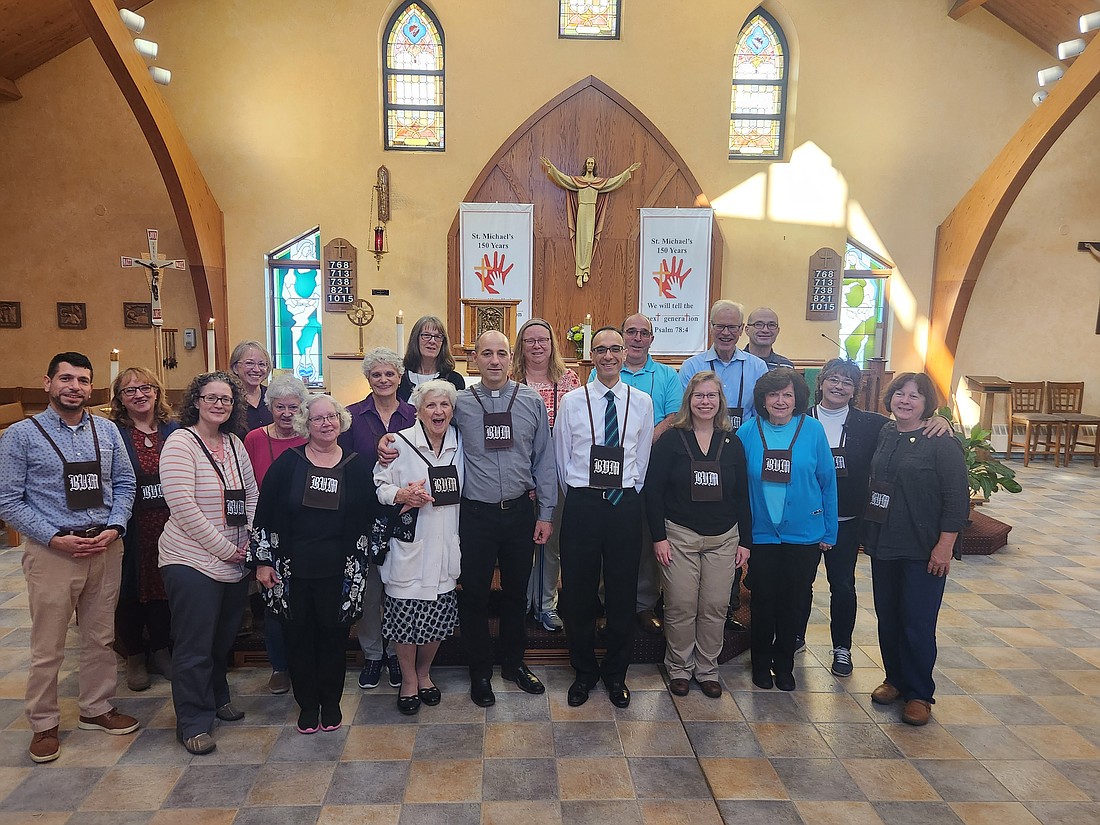November 9, 2023 at 10:58 a.m.
‘I brought you into the land of Carmel’
About 15 years ago, I stood in the sacristy of St. Joseph’s Church in Troy looking at several handcrafted figures of the Carmelite Order. Each was meticulously crafted by Father Romaeus Cooney, a seasoned priest of the same order. There was a wooden plaque below the display which had been written out in Vulgate Latin; “induxi vos in terram Carmeli” (I brought you into the land of Carmel, Jeremiah 2:7, LXX)
Looking back, I know this was the time that the seeds of a vocation to Carmel were planted. For us with faith, when we reflect on such moments, we discern the movements of God unfolding around us and in us. These words of the prophet Jeremiah speak of my journey into Carmel.
When it comes to a vocation, it’s easy to focus on us and what we are called to do. The danger in this is that we may forget or perhaps suppress the idea of what it means to be called. However, if we consider that passage from the prophet Jeremiah, we discover the active agent in a vocation through the word “I.” I brought you into the land of Carmel! It is a startling proposition. Here, for us, God is not a distant proposition. God is not a nebulous energy, or the word one uses to describe an unknown scientific first cause. God is an I. God who is reason, logic and being itself can truly be identified and known with intimacy. In the time of Jeremiah, and indeed the Old Testament in general, the sacred authors present God as a person, with human qualities and emotions. Thus, God can speak of His people, and they in turn can speak of their God. As God’s people we belong, we can be chosen, loved and receive a vocation.
Jeremiah proposes Carmel as the landscape for living out one’s vocation. For Carmelites, Elijah and Carmel are inseparable because of the favor God showed to Elijah, along with his marvelous deeds and contemplative retreats made there. Great Carmelites along with the early Fathers of the Church regard Elijah as the inspiration for all eremitical and religious life, other orders building upon his foundational legacy. Carmelites, though, have chosen to retain Elijah himself as founder while striving to imitate his life of prayer, contemplation and active apostolate. To this pivotal figure, a Carmelite will often return in contemplation and prayerful examination of conscience.
A vocation to Carmel may be understood in terms of the double spirit of Elijah. Recall the story, “Then Elijah took his mantle, and rolled it up, and struck the water, and the water was parted to the one side and to the other, till the two of them could go over on dry ground. When they had crossed, Elijah said to Elisha, “Ask what I shall do for you, before I am taken from you.” And Elisha said, “I pray you let me inherit a double share of your spirit” (2 Kgs 2:8-9). Elijah granted the request, leaving Elisha and his spiritual progeny a great gift.
The first portion of Elijah’s spirit passed on to Elisha may be understood as the inheritance of the Father, the portion of a firstborn, and the portion of the privileged children. Carmelites consider Elijah not only a founder but a father as well. Therefore, Carmelites are the privileged children of this great prophet and seek the portion of the firstborn. We receive this portion of Elijah’s spirit by imitating his uncompromising zeal for God. This is a classic Old Testament type, where the true portion of the firstborn is the life of grace we receive as children of the Father, incorporated into His life through baptism. We remain in grace by following the example of Jesus His Son.
Secondly, Elijah’s double spirit is the balance of contemplative and active life. He was, more than anything else, a great contemplative. However, even as he engaged in the heights of contemplation, God would call him from contemplative life into the active life of serving His people. There can be little doubt that such an active life secured Elijah a place in Israel’s history as an untiring laborer. Despite this, he often returned to the solitude of contemplation. In this way, Carmelites always hunger to return from their activities to seeking God’s face in contemplation which the Church has always regarded as the “better part” of a vocation (cf. Lk 10:42).
Does such a life of prayer, contemplation and apostolate appeal to you? If you long for the double spirit of the prophet Elijah, I invite you to consider that God may be calling you into the land of Carmel. Whether lay or ordained, the 3rd Order Carmelite community of St. Elijah welcomes you. Contact Dr. Cathleen Carney ([email protected]) to learn more about our local Carmelite community and discerning a vocation to Carmel.
Deacon James Agnew is a deacon at the Cathedral of the Immaculate Conception in Albany.
MORE NEWS STORIES
- Gaza parish attack, Marian devotion & vocations, St. Thomas More exhumation | Week in Review
- Catholic “American Ninja Warrior” fighting world hunger, one obstacle at a time
- Washington Roundup: Trump’s Epstein fallout; Congress backs rescissions; IRS church policy shifts
- Amid tragic deaths, Opus Dei men recalled as prayerful, inspiring sons of God
- Bishop places restrictions on Catholic influencer accused of misconduct, pending investigation
- Court blocks WA mandatory reporter law over lack of confession protections
- World leaders ‘appalled’ by Gaza church attack, amid calls between Vatican, Tel Aviv and Washington
- Houses destroyed, church burnt: new wave of violence against Syrian Christians
- Israeli PM calls pope, who urged the leader to start negotiations, ceasefire
- Patriarchs’ message on Gaza visit: Gaza’s community will not be abandoned or forgotten










Comments:
You must login to comment.